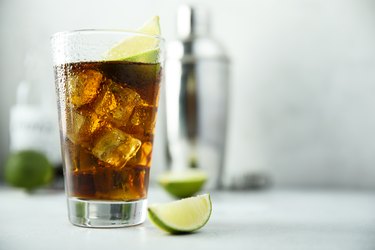
Saccharin and aspartame are two artificial sweeteners that have been rigorously studied for their safety in the past few decades. Although the Food and Drug Administration (FDA) deems both saccharin and aspartame to be safe, various consumer safety groups and health professionals disagree.
Scientific studies have found links in animal studies between these sweeteners and cancer. Although the FDA reports that studies examining both sweeteners are inconclusive, there is more evidence against aspartame, which could potentially mean that it's more dangerous.
Video of the Day
Video of the Day
The Mayo Clinic recommends using artificial sweeteners in moderation, and also points out that "sugar-free" isn't the same as "calorie-free."
Tip
Saccharin and aspartame are two artificial sweeteners that are both deemed safe for consumption.
Understanding Saccharin Basics
Saccharin, a white crystalline powder, is 200 to 700 times sweeter than sugar, according to the U.S. National Library of Medicine (NLM), and contains no calories. It is one of the most commonly used artificial sweeteners in soft drinks and is used in a variety of other products, including fruit juices, chewing gum, mouthwash, toothpaste and pharmaceuticals.
Saccharin was moved to the list of potential human carcinogens in 1980. However, a petition from the Calorie Control Council prompted the Environmental Protection Agency (EPA) to reassess the safety of saccharin.
Based on evaluations that the National Toxicology Program conducted the EPA decided saccharin was safe and removed it from the hazardous substances list. This led to a December 2010 repeal of the warning label that was previously required for saccharin products, according to the EPA.
Saccharin Safety
In the early 1970s, saccharin was thought to be a carcinogen when it was linked to bladder cancer. This link was based on studies done on rats. The National Cancer Institute notes human trials have found no such link and that the mechanism that caused bladder cancer in rats does not exist in humans.
Still, the Center for Science in the Public Interest believes saccharin is unsafe and has issued the sweetener its lowest rating of "avoid." In a statement, the CSPI acknowledged saccharin has not been proven to cause cancer in humans, but contends saccharin may still present a risk.
Understanding Aspartame Basics
Aspartame, one of the most common artificial sweeteners, is a combination of two amino acids — phenylalanine and aspartic acid. Aspartame is 200 times sweeter than sugar and, like saccharin, contains no calories, according to the NLM.
The National Cancer Institute notes debates over potential negative health effects of aspartame, including cancer, have been ongoing for many years.
However, after reviewing a large number of studies on the safety of aspartame, both the FDA and the European Food Safety Authority agree average aspartame consumption poses little risk to humans.
Aspartame Safety
In July 2023, the World Health Organization listed aspartame as "possibly carcinogenic to humans" with "limited evidence," although the group still says up to 40 milligrams per kilogram of body weight per day of aspartame is safe.
The FDA disagrees that the limited evidence points to human cancer risk, and suggests up to 50 milligrams per kilogram of body weight per day is safe. That's about the amount in 20 cans of diet soda per day for 180-pound person.
The CSPI has issued aspartame a rating of "avoid."
Based on this information, aspartame may be worse than saccharin, but you shouldn't worry too much about either if you're using them in moderation, according to the FDA.
- National Cancer Institute: "Artificial Sweeteners and Cancer"
- Center for Science in the Public Interest: "Saccharin"
- American Cancer Society: "Aspartame"
- European Food Safety Authority: "Scientific Opinion on the Re-evaluation of Aspartame (E 951) as a Food Additive"
- Center for Science in the Public Interest: "European Safety Review of Aspartame a Whitewash, Says CSPI"
- Center for Science in the Public Interest: "Chemical Cuisine"
- Food and Drug Administration: "Aspartame"
- Food and Drug Administration: "Saccharin"
- Environmental Protection Agency: "Removal of Saccharin From the Lists of Hazardous Constituents and Hazardous Wastes Under RCRA and From the List of Hazardous Substances Under CERCLA"
- Mayo Clinic: "Artificial Sweeteners and Other Sugar Substitutes"
- U.S. National Library of Medicine: "Sweeteners — Sugar Substitutes"